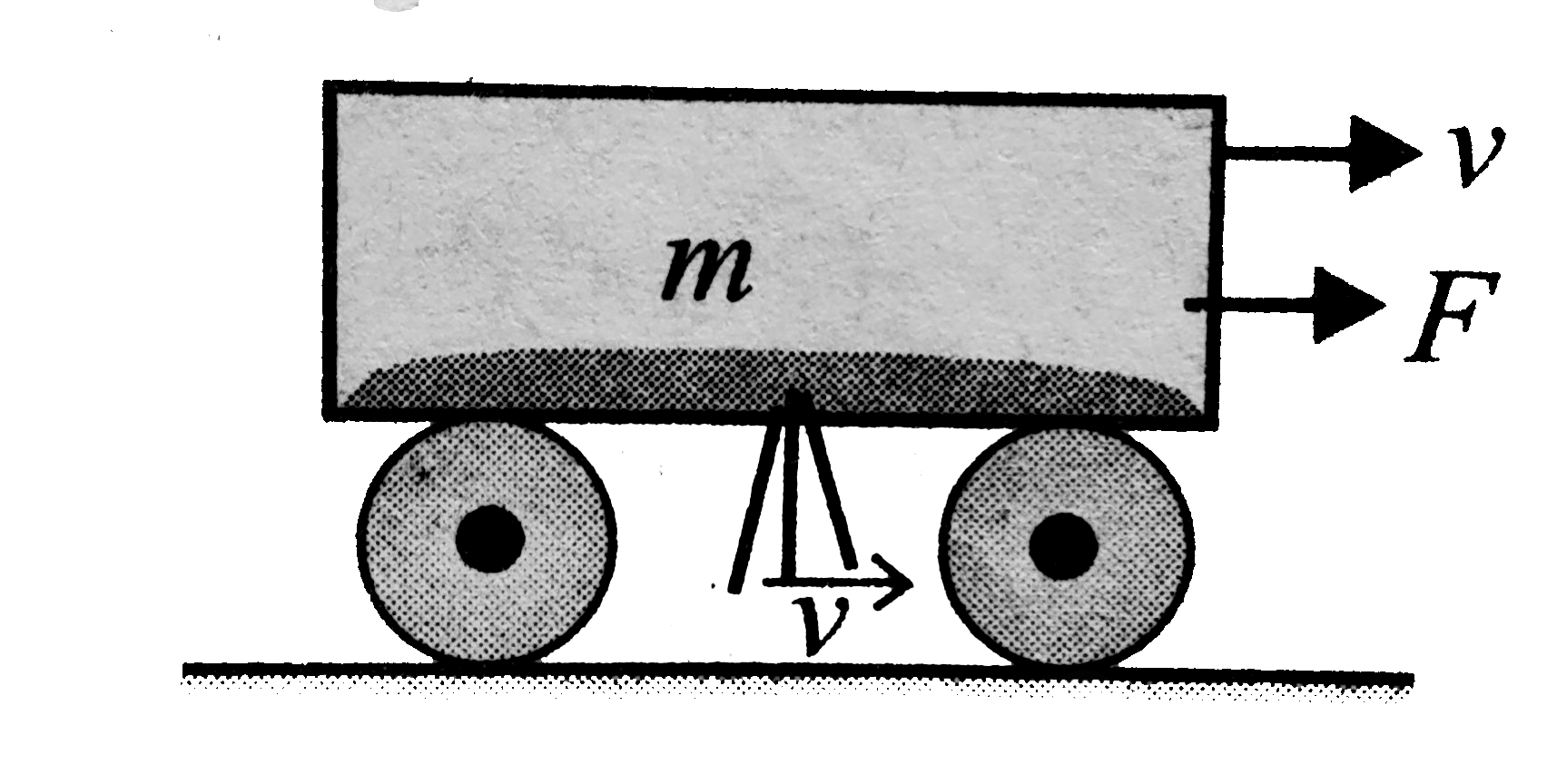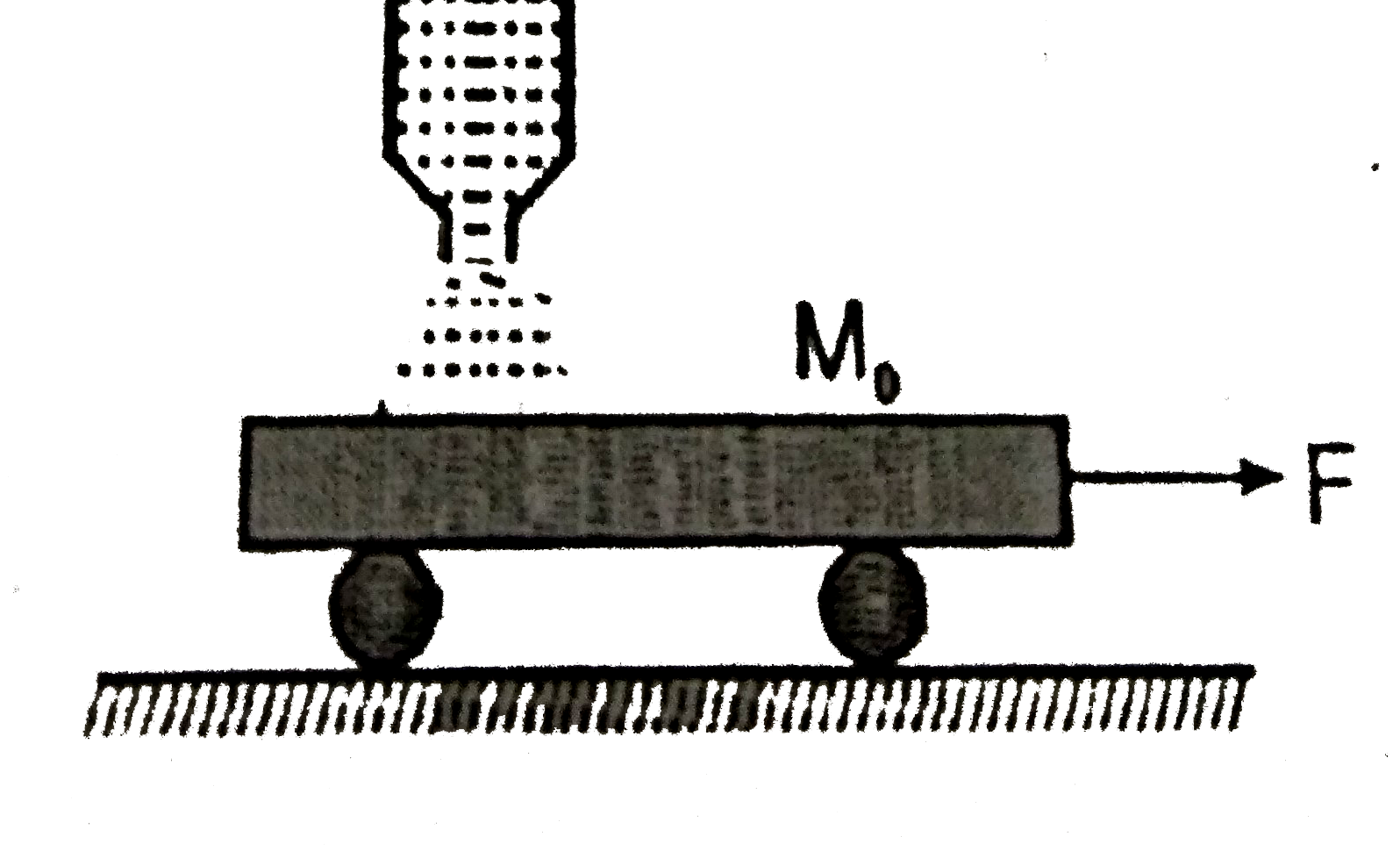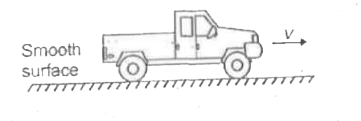A cart loaded with sand moves along a horizontal plane due to a constant force F coinciding in direction with the cart's velocity vector. In the process, sand spills through a hole in the bottom with a constant rate μkg/s. Find the acceleration and the velocity of the cart at the moment t, if at the initial moment t=0 the cart with loaded sand had the mass m0 and its velocity was equal to zero. The friction is to be neglected.
In this problem the sand spills through a hole at the bottom of the cart. Hene ,the relative velocity of the sand vr will be zero, because it will acquire the same velocity as that of the cart at the moment of separation.

vrel=0
Apply F=vreldmdt=mdvdt
⇒F+0×(dmdt)=(m0−μt)dvdt .............i
⇒(m0−μt)dvdt=F
or ∫v0dv=∫t0Fdtm0−μt
⇒v=F−μ[In(m0−μt)]t0
or v=FμIn(m0m0−μt)
Frome eqn i acceleration of the cart
a=dvdt=Fm or a=Fm0−μt
Topper's Solved these Questions
- BOOK - CENGAGE PHYSICSCHAPTER - CENTRE OF MASSEXERCISE - Solved Examples13videos
CENTRE OF MASS
- BOOK - CENGAGE PHYSICSCHAPTER - CENTRE OF MASSEXERCISE - Exercise 1.120videos
CENTRE OF MASS
- BOOK - CENGAGE PHYSICSCHAPTER - CALORIMETRYEXERCISE - Solved Example13videos
CALORIMETRY
- BOOK - CENGAGE PHYSICSCHAPTER - DIMENSIONS & MEASUREMENTEXERCISE - Integer2videos
DIMENSIONS & MEASUREMENT
Similar Questions
A cart loaded with sand moves along a horizontal plane due to a constant force F coinciding in direction with the cart's velocity vector. In the process, sand spills through a hole in the bottom with a constant velocity μkg/s. Find the acceleration and the velocity of the cart at the moment t, if at the initial moment t=0 the cart with loaded sand had the mass m0 and its velocity was equal to zero. The friction is to be neglected.
View SolutionA cart loaded with sand moves along a horizontal plane due to a constant force F coinciding in direction with the cart's velocity vector. In the process, sand spills through a hole in the bottom with a constant rate μkg/s. Find the acceleration and the velocity of the cart at the moment t, if at the initial moment t=0 the cart with loaded sand had the mass m0 and its velocity was equal to zero. The friction is to be neglected.
View Solution
Knowledge Check
- Question 1 - Select One
In the figure shown a cart moves on a smooth horizontal surface due to an external constant force of magnitude F. The initial mass of the cart is M0 and velocity is zero. Sand falls on to the cart with negligible velocity at constant rate μkg/s and sticks to the cart. The velocity of the cart at time t is :
 AFtM0+μtBFtM0eμtCFtM0DFtM0+μteμ1
AFtM0+μtBFtM0eμtCFtM0DFtM0+μteμ1 - Question 2 - Select One
A cart loaded with sand having total mass m0=1800kg moves on a straight horizontal road starting from rest under the action of a force of 120N. The sand spills through a small hole hole in the bottom at a rate of 0.5 kg/sec. What will be the velocity of cart after 20 min?
A220 m/secB240 ln (32)C120m/secDNone of these - Question 3 - Select One
A cart moves with a constant speed along a horizontal circular path. From the cart, a particle is thrown up vertically with respect to the cart.
AThe particle will land somewhere on the circular pathBThe particle will land outside the circular pathCThe particle will follow an elliptical pathDThe particle will follow a parabolic path
A cart loaded with sand having total mass m0=1800kg moves on a straight horizontal road starting from rest under the action of a force of 120N. The sand spills through a small hole hole in the bottom at a rate of 0.5 kg/sec. What will be the vertically of cart after 20 min?
View SolutionA cart loaded with sand moving with velocity v. Sand is falling through the hole as shown in diagram then after falling on the ground sand is
 View Solution
View SolutionA flatcar of mass m0 starts moving to the right due to a constant horizontal force F(figure). Sand spills on the flatcar from a stationary hopper. The velocity of loading is constant and equal to μkg/s. Find the time dependence of the velocity and the acceleration of the flatcar in the process of loading. The friction is negligibly small.
 View Solution
View SolutionA cart moves with a constant speed along a horizontal circular path. From the cart, a particle is thrown up vertically with respect to the cart.
View SolutionSelect the most appropriate option to fill in the blanks.
______ cart loaded with mangoes turned upside down on ______ main road.View Solution

